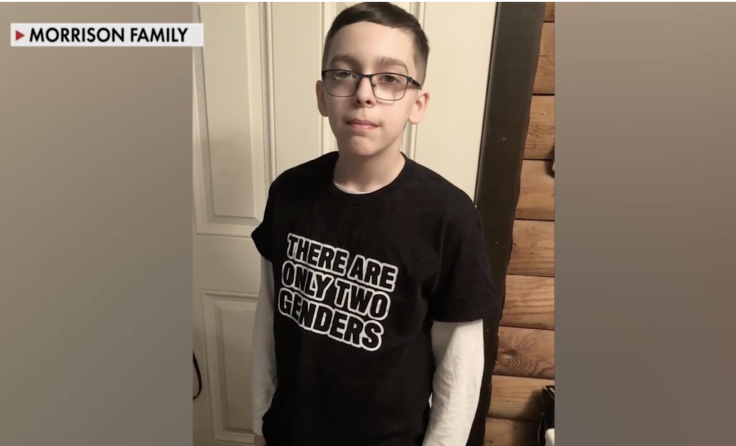
The U.S. Supreme Court is set to decide later this month whether it will hear the appeal of a Massachusetts middle school student who was barred from wearing a T-shirt stating "THERE ARE ONLY TWO GENDERS." The case comes amid a broader national debate over transgender rights, with the Trump administration doubling down on policies restricting recognition of gender identities beyond male and female.
The legal battle began in 2023 when Liam Morrison, then a seventh-grader, was sent home from John T. Nichols Middle School in Middleborough, Massachusetts, after refusing to change his shirt. School officials cited concerns that the message would negatively impact transgender and gender-nonconforming students, many of whom had reportedly faced bullying and mental health struggles.
A Clash Between Free Speech and School Policy
Liam's attorneys argue that the school violated his First Amendment rights by preventing him from expressing his views in a "passive, silent, and untargeted" manner. Represented by Alliance Defending Freedom (ADF), a conservative legal group, Liam's legal team contends that the school permits LGBTQ+ messaging but censors opposing viewpoints.
"The school 'can flood its halls' with pride flags and messages of support for LGBTQ+ students, but when a student expresses a differing view, he is silenced," ADF attorney David Cortman stated. "This case isn't about a T-shirt—it's about whether the government can dictate which opinions are allowed in public schools."
Massachusetts middle schooler banned from class for wearing 'there are only two genders' t-shirt appeals his case to the Supreme Court
— Melissa Hallman (@dotconnectinga) October 10, 2024
Liam Morrison claimed his father had to pick him up from John T. Nichols Jr. Middle School in March 2023 when he refused to change out of his… pic.twitter.com/QZ5tENkdKG
School officials, however, argue that dress codes allow them to regulate disruptive or harmful speech, particularly when it affects student well-being. According to court filings, teachers raised concerns that the message on Liam's shirt could contribute to a hostile learning environment, given that some gender-nonconforming students had already experienced suicidal thoughts due to bullying.
The school's dress code policy prohibits clothing with hate speech, offensive imagery, or messages that target groups based on gender identity, sexual orientation, race, or religion. Administrators determined that Liam's shirt fell under that category and asked him to remove it. When he refused, he was sent home.
Court Rulings and Potential Supreme Court Review
The 1st U.S. Circuit Court of Appeals in Boston ruled in favor of the school, stating that public schools have the right to limit speech that could be reasonably interpreted as harmful or disruptive. The ruling cited the 1969 Supreme Court case Tinker v. Des Moines, which upheld students' free speech rights but acknowledged that schools could prohibit speech that causes substantial disruption.
Judge David Barron, writing for the three-judge panel, emphasized that unlike the black armbands worn to protest the Vietnam War in Tinker, Liam's T-shirt "directly challenges the identities of some students," USA Today reported. The court ruled that schools must exercise discretion in balancing free speech with the well-being of their students.
Liam's legal team has appealed to the Supreme Court, arguing that the ruling gives too much deference to school officials and weakens students' free speech rights on controversial topics. If the high court takes up the case, it could set a significant precedent on the limits of student expression in schools.
Trump Administration's Role in the Debate
The case unfolds against the backdrop of a broader push by the Trump administration to restrict transgender rights.
Donald Trump says God created only two genders, male and female. pic.twitter.com/CJSUDRSOTA
— Globe Eye News (@GlobeEyeNews) August 10, 2024
On his first day back in office, President Donald Trump signed an executive order declaring that the federal government would only recognize two sexes—male and female. His administration has also rolled out policies affecting transgender individuals in military service, school sports, and healthcare.